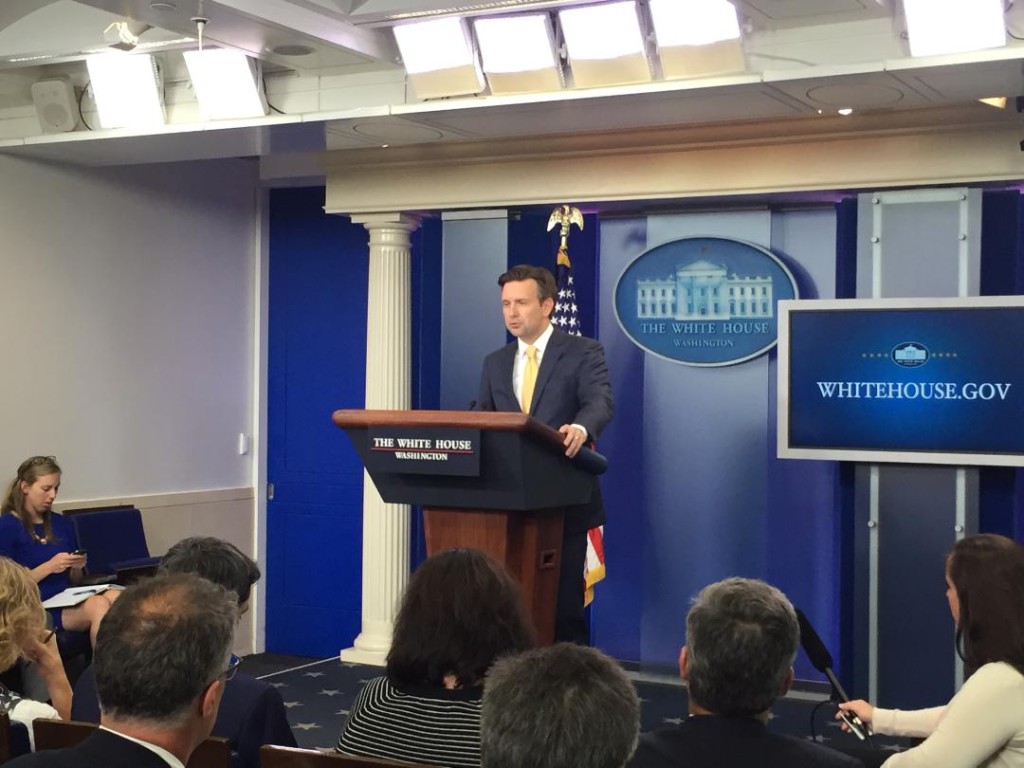
Sen. Lisa Murkowski, R-Alaska, makes keynote remarks at the Atlantic Council on Thursday. (Mallory Hughes/Medill NSJI)
WASHINGTON — The US has long used its economic prowess and military force to exert influence around the world. Now, a growing chorus of lawmakers, analysts, and industry insiders are pointing to another potential tool in the country’s foreign-policy toolbox: energy abundance.
US oil and gas production is booming, new wind and solar plants are coming online in record quantities, and enhanced efficiency measures are helping Americans use energy more wisely. It’s why some are pushing to overturn decades-old laws that were designed in an era of scarcity and uncertainty. But not everyone is on board – some worry that opening up US energy to outside markets exacerbate the environmental impact of fossil fuels and increase the country’s exposure to volatile global markets.
At the center of the debate are the laws that limit US oil and gas exports.
This week, Sens. Lisa Murkowski (R) of Alaska and Mark Warner (D) of Virginia called for lifting the current ban on crude oil exports as a way of modernizing US energy laws and maximizing the benefits of the nation’s energy abundance.
“I don’t think anyone could have predicted a decade ago that we would have access to as ample resources we do today,” Sen. Warner, said at the Atlantic Council on Thursday.
As co-chairs of the council’s Global Energy Center’s task force, the senators released a report focusing on the US energy boom and its impact on the US as a global leader.
It came just before the Senate Energy and Natural Resources Committee approved a bipartisan energy bill, cosponsored by Sen. Murkowski, the chairwoman of the committee, and ranking member, Maria Cantwell, (D) of Washington. The legislation would permit crude oil exports and speed up liquefied natural gas (LNG) exports.
“LNG exports, pipelines, regional perspectives, modernizing the strategic controlling reserves, improving the energy security of our closest allies,” Murkowski, said, “This is what we can do when we view energy as a strategic asset.”
The US produced nearly 14 million barrels of oil per day in 2014, compared to just 8 million barrels per day in 2005, according to the US Energy Information Administration. But it exported only 346,000 barrels per day because US policy prohibits crude oil exports except in limited cases.
“Collectively, these recommendations move the ball down the field as they provide the US with some economic leverage when negotiating with various partners around the world,” said James Koehler, an associate director at Berkeley Research Group and an energy finance, policy and markets expert.
If the US were to allow more energy exports, Mr. Koehler said, leverage at the negotiation table could be stronger.
“Because we have constraints on our energy supply and usage, we’re not able to use this tool as effectively as we can,” Sen. Warner said.
The 40-year-old ban on crude oil exports was put in place in the 1970s in the wake of the Arab oil embargo, which sent shockwaves through the global economy. The ban remains in place today, albeit slightly modified.
Warner added that it might be hard for the domestic energy industry to see the value of international trade. The implications of lifting the ban are uncertain, though some experts predict downward pressure on domestic prices if US oil begins to flow more freely across the globe.
“As commodities like oil are fungible, the WTI-Brent spread [which provide benchmarks on crude oil prices] will likely shrink and price impacts could be a more regional, short-term issue as we change some of our policies,” Koehler said. “But because gasoline is benchmarked off Brent, prices in the long term are likely to equalize based on market conditions and outlooks.”
Technological innovations in the American economy, and in the energy sector in particular, have advanced energy production and reduced greenhouse gas emissions, but there are still environmental challenges, especially at the local level.
“Increasing America’s energy outlook and at the same time not stepping back from our commitment to take on the very real threat of climate change are in no ways contradictory,” Warner said. “I think those can both get done.”
Lee Stewart, a member of Beyond Extreme Energy, a group dedicated to limiting permits for fossil fuels and promoting clean energy, is concerned with the environmental impacts that energy production, especially fracking, has on the local community.
Mr. Stewart said the scientific case for keeping fossil fuels in the ground to combat climate change has been trumped in the minds of some legislators by the energy boom, which he argued only brings short-term gain and economic relief.
Matt Sagers, a managing director at IHS Energy who contributed to the report, said the issues are not black and white.
“There’s no question in the senator’s [Warner] mind that global warming is a serious problem,” he said. “On the other hand, US energy is a key part in where we’re going.”
Published in conjunction with 









